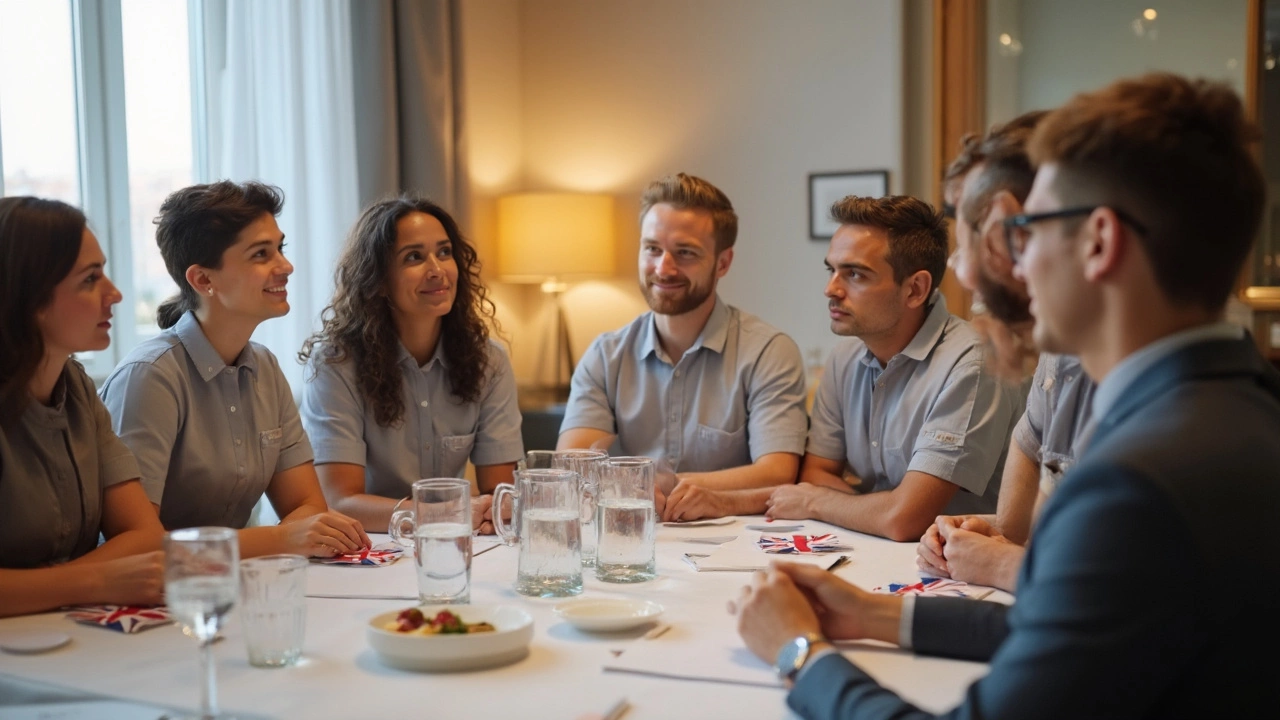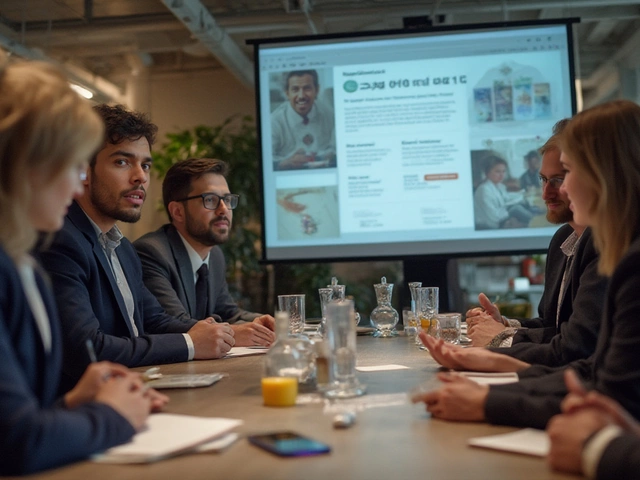Hospitality training isn't just about putting on a smile and knowing which fork goes where. It's teaching people to handle real-world curveballs—like calming down a frustrated guest or making quick decisions when the kitchen is slammed. The big goal? Make every customer feel welcome and want to come back.
If you’ve walked into a hotel or restaurant and remembered the staff more than the food or the decor, that’s hospitality training in action. It covers everything from the obvious stuff—like greeting guests and serving food—to those behind-the-scenes skills, like reading body language and problem solving on the fly. Most people are surprised at how often you need to think on your feet, especially when things don’t go as planned.
- What Hospitality Training Actually Means
- Common Skills Taught in Hospitality Training
- Why Hospitality Training Really Matters
- How Hospitality Training is Delivered
- Tips to Maximize Hospitality Training
What Hospitality Training Actually Means
When someone talks about hospitality training, they’re referring to teaching people all the key things needed to deliver great service in places like hotels, restaurants, cafes, or even airports. It covers way more than just being friendly. The goal is to arm staff with a toolbox of skills so that, no matter what happens, guests leave with a smile—or at least without a complaint.
Good hospitality training includes real-deal skills such as:
- How to greet guests the right way, not just by rote.
- Responding to problems quickly, without passing the buck.
- Staying cool when things are hectic (think Saturday night dinner rush or fully booked check-in desk).
- Knowing how to handle sensitive situations, like unhappy guests or special requests.
- Mastering the basics—serving food, checking people in, recommending menu items, and keeping spaces clean.
There’s a science behind why businesses invest in training. According to a 2023 AHLA study, hotels and restaurants that put just two extra hours a week into staff training saw a 28% jump in positive guest feedback over six months. That means real results: More repeat customers, better reviews, and sometimes even higher tips for staff.
| Training Focus | Impact on Guest Satisfaction |
|---|---|
| Basic Customer Service | +15% |
| Conflict Resolution | +22% |
| Personalized Recommendations | +28% |
The main thing to remember? Hospitality skills can be learned, and they make a real difference—not just in how a business runs, but in whether people wish they could stay just a little longer.
Common Skills Taught in Hospitality Training
Most people hear hospitality training and think it’s just ‘customer service with manners.’ There’s way more to it than that. Good training covers a whole bunch of skills that make the difference between just a job and a place where guests actually feel looked after.
- Communication skills: You can’t help someone if you don’t understand what they want. Trainees practice both clear speaking and real listening, including body language and tone.
- Problem-solving: Things go wrong—a lot. Guests complain, reservations get lost, someone wants something off-menu. Training helps with handling surprises without freezing up or passing the buck.
- Emotional intelligence: This is a fancy way of saying “reading the room.” Trainees learn how to tell if a guest is upset, confused, or just impatient, and how to react without making it worse.
- Time management: When you’re juggling a full dining room or a long line at the front desk, you’ve got to keep things moving without forgetting anyone. Training usually includes tips like using checklists or breaking bigger jobs into steps.
- Teamwork: No one handles a full shift alone. New staff learn how to back each other up, share info, and pick up slack when it gets busy. It sounds basic, but hospitality is a team sport every single day.
If you want a quick breakdown of what most programs cover, here’s what the American Hotel & Lodging Educational Institute highlights:
| Skill Area | Focus |
|---|---|
| Customer Service | Greeting, handling questions & complaints |
| Technical Skills | Using booking systems, POS terminals |
| Health & Safety | Sanitation, fire safety, food safety laws |
| Sales | Upselling, making recommendations |
These aren’t just for managers—everyone from front desk staff to servers gets trained on these. The biggest surprise for newcomers? Hospitality skills get used in real life outside the job, too. You get better at handling people, staying calm, and even getting along with coworkers. It’s the kind of training that pays off everywhere, not just behind a counter or in a hotel lobby.

Why Hospitality Training Really Matters
If you think hospitality training is just corporate fluff, think again. Places that take their training seriously often see a huge jump in repeat customers and positive reviews. For example, a study by Cornell University’s School of Hotel Administration showed that hotels with regular hospitality skills training had a 15% higher guest satisfaction rating than those that didn’t invest in training. That’s a big deal when guests have hundreds of options and make choices based on online ratings.
It isn’t just about the obvious stuff like serving food or taking reservations. Problems pop up all the time—a guest complains about a noisy room, someone’s order gets mixed up, or a team member calls out sick during a busy shift. Folks who’ve had solid hospitality training handle these situations without panic. They keep cool and make guests feel valued, which keeps people coming back instead of running to a competitor.
Check out the impact of solid training in the numbers:
| Benefit | Without Training | With Training |
|---|---|---|
| Guest Satisfaction Rate | 76% | 88% |
| Employee Turnover | 38% | 22% |
| Online Review Rating | 3.8/5 | 4.5/5 |
Good hospitality skills don’t just boost the guest experience—they also save companies money. Lower employee turnover means less money spent on hiring and training new people all the time. Plus, when staff know what they’re doing, day-to-day stuff runs smoother. Guests spend more money, tell their friends, and those five-star reviews stack up.
Bottom line: If a place doesn’t invest in hospitality training, it’s basically leaving money (and customer loyalty) on the table.
How Hospitality Training is Delivered
The way hospitality training happens is a lot more hands-on than you might think. Forget boring lectures; most places use a mix of real-world practice, team games, and bite-sized online lessons. The goal is simple: get people ready for anything guests might throw at them—literally and figuratively.
First, there's on-the-job training. This means you learn by actually doing the work. New hires usually shadow experienced staff, picking up tips about body language, timing, and even how to remember regular customers’ names. In busy hotels and restaurants, this method is super common because it gets you up to speed fast.
Plenty of chains also use online platforms for training. You’ll see short videos, quizzes, and even interactive simulations. It lets people train on their own time and repeat tricky parts until they get it. Some programs track how long it takes staff to finish certain tasks, aiming for real world speed—not just textbook answers.
Group workshops and role-playing games are big, too. One minute you might be dealing with an angry guest as part of an exercise, and the next you’re switching roles to see things from the guest’s side. These sessions help with things like empathy and staying calm under pressure.
| Training Method | Used By | Focus Area |
|---|---|---|
| On-the-job (Shadowing) | Restaurants, Hotels | Practical real-world skills |
| Online Modules | Large hotel chains, Franchises | Consistency & repeatable info |
| Workshops/Role-play | Independent venues, Upscale hotels | Problem-solving, Guest empathy |
| Mentorship | Boutique hotels | Personalized guidance |
Don’t forget about feedback. The best hospitality training programs include quick check-ins after shifts and weekly reviews, not just yearly evaluations. Managers point out what went well and offer quick tips to fix what didn’t. This constant feedback loop helps people get better every single shift—and keeps them from repeating mistakes.

Tips to Maximize Hospitality Training
There’s a big gap between going through the motions and genuinely nailing hospitality training. You want your crew to do more than memorize a script or just follow checklists. Here’s what actually moves the needle for stronger customer service and top-notch guest experiences.
- Make training hands-on. Jumping right into real situations or role-play beats any slideshow. When staff handle live scenarios (like a customer returning a meal or rooms overbooked during a holiday), they learn how to stay cool and make quick, smart judgments.
- Give specific feedback, fast. Don’t wait for yearly reviews—call out what worked and what needs tweaking as it happens. The quicker the feedback, the easier it is for someone to adjust and get it right next time.
- Focus on people skills, not just rules. Policies change; new menus come and go. But reading a guest’s mood or empathizing with a stressed coworker takes real practice. Encourage staff to swap stories or share what’s worked during tough shifts.
- Keep things short and steady. Hour-long lectures don’t stick. Break training into small chunks—like weekly 10-minute refreshers or friendly competitions on who remembers the allergy policy best. Small doses build habits way better than cramming once a year.
- Celebrate wins—big and small. Spot someone turning a bad situation around or getting praise from guests? Shout them out in front of the team. It boosts morale and shows you notice when hospitality goes above and beyond.
If you want stats, here’s a simple one: according to a 2024 survey from AHLA (the American Hotel & Lodging Association), teams who did weekly refreshers on hospitality skills had a 20% higher guest satisfaction score compared to those with yearly big-batch training.
| Training Frequency | Guest Satisfaction Score |
|---|---|
| Weekly Refreshers | 88% |
| Annual Big Sessions | 68% |
At the end of the day, hospitality training should be active, personal, and always evolving. Keep it real and relevant, and your team will make guests feel at home without breaking a sweat.





Write a comment